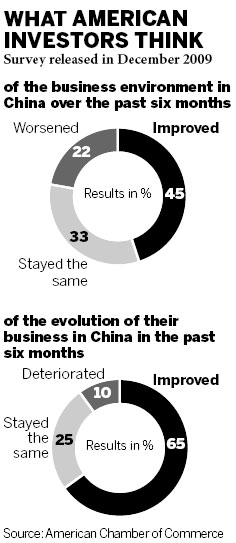Companies
US firms mixed on biz environment
By Wang Ying (China Daily)
Updated: 2010-08-18 09:35
 |
Large Medium Small |
SHANGHAI - The continued rapid growth of China's economy has encouraged many American companies to expand their operations in the country.
 But some work has to be done before the country grows into a more attractive investment destination, such as wider market access, improved intellectual property protection and greater transparency, said an official from the American Chamber of Commerce in Shanghai (AmCham Shanghai).
But some work has to be done before the country grows into a more attractive investment destination, such as wider market access, improved intellectual property protection and greater transparency, said an official from the American Chamber of Commerce in Shanghai (AmCham Shanghai).
David Basmajian, director of communications & publications from AmCham Shanghai, said that American companies are cautiously optimistic about their prospects in China.
But "they are particularly concerned about full market access, transparency in the way that laws and regulations are enacted, formed and implemented, national treatment, IPR enforcement and protection, and most recently indigenous innovation", Basmajian said.
Figures from AmCham Shanghai show that China's government procurement (GP) market was estimated to be around $100 billion in 2009, and is expected to continue to grow this year.
"Obviously, American companies want to be able to bid on contracts with the country, and to be able to be treated as any others," said Basmajian.
However, high-tech industries will be particularly impacted by the independent innovation policies promoted by the Chinese government.
"AmCham welcomes China's efforts to expand its innovative capacity; however the indigenous innovation policy is undermining rather than promoting China's goal of advancing and innovation, as innovation is increasingly global and collaborative," he said.
Although far from perfect in terms of market environment, a survey released in April by AmCham Shanghai said the business environment in China has either improved or stayed the same over the past six months.
|
||||
"It is business as usual in China but the environment is becoming more competitive," said Pierre E. Cohade, president of Goodyear Asia Pacific.
"With the business climate as positive as ever, the focus is now 'in China for China'. Successful companies need to continue to invest in building both capacity and capabilities and incorporate best global business practices to thrive in this market," he added.
Basmajian noted that the surveys conducted by AmCham China in Beijing and Shanghai have some differences.
"Many of our member companies have their headquarters in Shanghai, so they are the focus of the companies' daily operations, while members in Beijing are more focused on government relations and other issues at that level.



